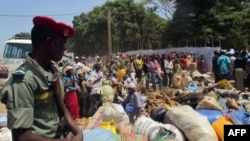The International Monetary Fund (IMF) said the economy of central African states is vulnerable to a sharp decline due to decreasing oil prices, terrorism and armed conflicts. It also said the region's progress on reducing poverty will be slow and hindered by high inequality.
Mario de Zamaroczy, head of the African Division at the IMF, said the rate of economic growth in Central African countries has stagnated at barely five percent due to the crisis in the Central African Republic and terrorism threats from the Nigerian militant group Boko Haram.
De Zamaroczy said outdated fiscal policies in the region and the current drop in oil prices, from $105 in August to $85 per barrel by October, will make it difficult to attain the IMF's projected six percent economic growth rate for Sub-Saharan Africa in 2015.
"One of the recommendations is to take a very serious look at the various customs and tax exemptions that were instituted in 2007/2008 in a very different context. Maybe they were justified back then, but today we find that their social implications are not there anymore. Their social impact is not as it used to be," he said.
Economist Fondo Sickot, a professor at the University of Yaounde, said such a growth rate is not sufficient to put the countries on the path to economic emergence.
"The economy is not yet showing signs of an economy with a potential to emerge because the growth rate is still very low and poverty and unemployment are still very high," Sickot.
A United Nations report released earlier this year notes that Africa's recent growth remains far below the continent's potential. Meaningful job creation is weak and growth is not tackling the high poverty rate and rising inequality in many countries.
Three months ago, Carlos Lopes, executive secretary of the Economic Commission for Africa, said Central African countries have the resources for industrialization and agricultural transformation and the economy's current annual growth of just under five percent does not reflect the full potential that lies in the transformation of the riches of the countries.








